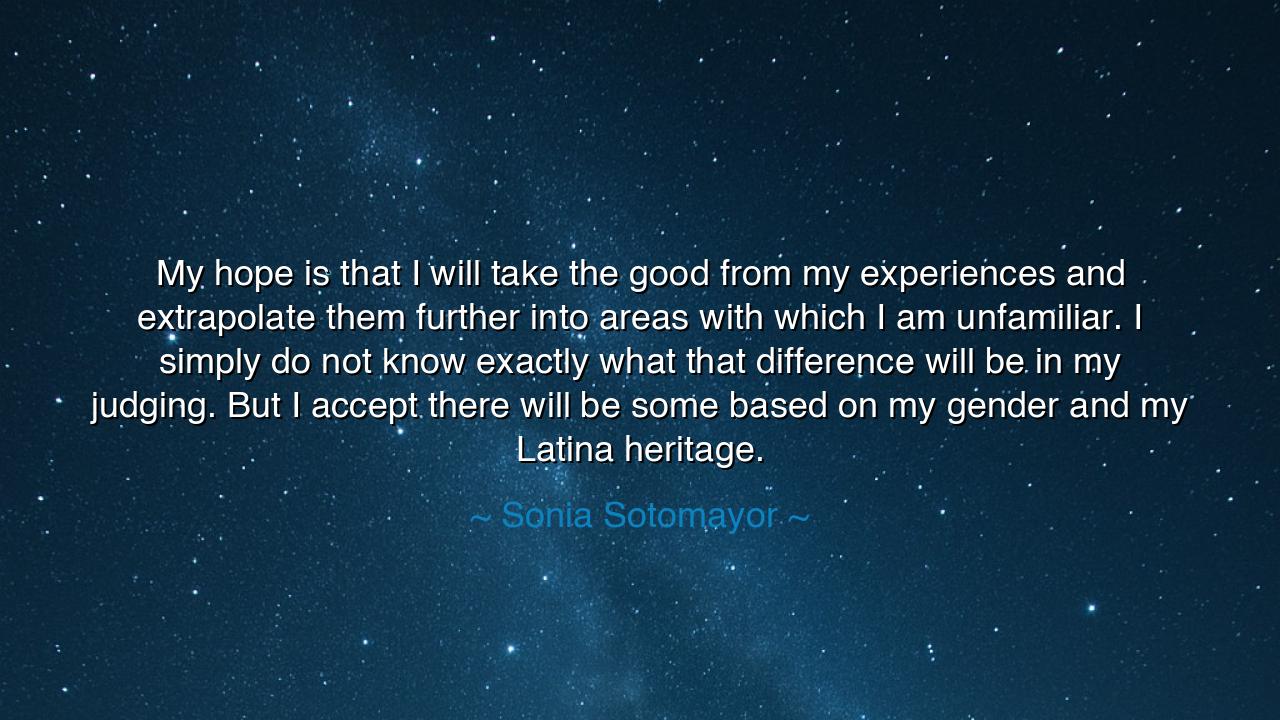
My hope is that I will take the good from my experiences and
My hope is that I will take the good from my experiences and extrapolate them further into areas with which I am unfamiliar. I simply do not know exactly what that difference will be in my judging. But I accept there will be some based on my gender and my Latina heritage.






The wise and steadfast Sonia Sotomayor, a daughter of the Bronx and a voice of justice on the highest court, once spoke these words: “My hope is that I will take the good from my experiences and extrapolate them further into areas with which I am unfamiliar. I simply do not know exactly what that difference will be in my judging. But I accept there will be some based on my gender and my Latina heritage.” These words, though rooted in humility, carry the quiet strength of a woman who understands that wisdom is born of experience, and that no one walks into truth without bringing their whole self along. They are the reflection of a soul aware of its origins, conscious of its perspective, and brave enough to let identity become not a barrier, but a bridge toward deeper understanding.
To accept one’s difference is a sacred act of courage. Sotomayor’s words remind us that justice is not blind to experience—it is enriched by it. She does not claim perfection, nor impartiality in some abstract sense; rather, she recognizes that her judgments, like all human judgments, are shaped by the soil from which she grew. In this, there is no shame, only truth. The ancients taught that the wise man must “know himself,” for only through self-awareness can one guard against ignorance. So too does Sotomayor’s statement embody that ancient wisdom—by acknowledging her roots, she transforms what others might see as limitation into a wellspring of insight and empathy.
The origin of these words lies in her speech “A Latina Judge’s Voice,” delivered long before her appointment to the Supreme Court. In them, she gave voice to an idea both revolutionary and timeless: that one’s heritage and life story are not obstacles to fairness, but instruments of understanding. As a woman and as a Latina, she bore the weight of two identities often underestimated in halls of power. Yet rather than diminish herself to fit the mold of others, she chose to stand fully in her identity. Her hope, as she said, was not to be perfect, but to bring the good from her experiences—the compassion of her culture, the resilience of her upbringing, the perspective of struggle—into a realm too often defined by abstraction and privilege.
History has shown again and again that the most transformative leaders are those who have embraced their uniqueness rather than concealed it. Consider the story of Nelson Mandela, who emerged from prison not with bitterness, but with a vision forged from his suffering. He, too, drew upon his personal history to guide a nation toward reconciliation. Likewise, Sonia Sotomayor, through her words, reveals that justice is not sterile logic—it is living empathy. The judge who knows hunger understands the weight of poverty; the judge who knows prejudice understands the fragility of dignity. Experience, when tempered with integrity, becomes the lens through which mercy and fairness meet.
Sotomayor’s statement also reflects a deep humility—an awareness that none of us can foresee precisely how our pasts will shape our decisions. She does not presume mastery, but embraces uncertainty as part of the journey. The greatest teachers of old, from Socrates to Confucius, spoke of humility as the foundation of wisdom. To say, “I do not know exactly what difference my experience will make,” is not to confess weakness, but to demonstrate honesty and self-knowledge. In that honesty lies the mark of a true judge, one who seeks truth not as possession, but as pursuit.
Her acknowledgment of her Latina heritage also stands as a beacon to those who have been told that their culture or identity must be left behind to succeed. Instead, she reclaims it as a source of moral clarity. Within that heritage lies the warmth of community, the reverence for family, the courage to rise from adversity—qualities that, far from biasing justice, humanize it. In this, she teaches that true impartiality does not mean the erasure of the self, but the full and honest use of one’s humanity in service to what is right.
So, my child, take this teaching into your heart: your experiences are not burdens—they are your teachers. Do not cast away your heritage or your history in pursuit of purity, for there is no wisdom in denial. Instead, gather the good from your past and carry it forward into the unknown. Let your perspective enrich your vision, but never harden it. Like Sotomayor, admit that you do not know all, but promise that what you do know will be guided by integrity, empathy, and truth.
For in the end, Sonia Sotomayor’s words are not only about judging in a court of law—they are about judging in the court of life. Each of us, in our own way, must weigh choices, assess others, and seek justice in the world around us. Her wisdom reminds us that the fairest judgment arises not from detachment, but from self-awareness, humility, and compassion. To know oneself is to see others more clearly; to honor one’s heritage is to honor the humanity we all share. And to walk this path—open-eyed, humble, and hopeful—is to ensure that the world grows a little wiser through our living.






AAdministratorAdministrator
Welcome, honored guests. Please leave a comment, we will respond soon